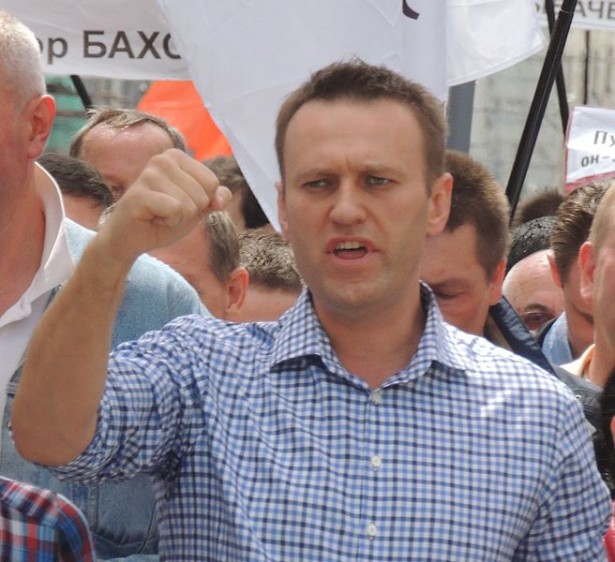
Russian opposition leader Alexei Navalny was sentenced to five years in a penal colony earlier this week after being found guilty of embezzlement — allegedly misappropriating approximately $500,000 from a state-owned lumber company. His last words on Twitter stated, “Don’t worry for me and don’t sit idle either because we have much work to do in the future.”
Supporters of the famous lawyer and Kremlin critic didn’t waste time, and thousands gathered just hours after the verdict in Moscow’s Manezhnaya Square to protest his conviction. Many prominent activists were present, including Olga Romanova, Boris Akunin, Dmitri Bikov and Boris Nemtsov, who told Waging Nonviolence, “It is a shame for the country and a shame for the government, which claims to promote democratic values. The court system has proved its primary role as President Putin’s slave. The whole trial was nothing but a cheap performance.”
Much to everyone’s surprise, however, Navalny was freed the following day, pending an appeal. It’s unclear whether the protests played a role in the reversal or if larger political positioning is at play, considering Navalny is also campaigning for the upcoming Moscow mayoral elections in September. There has been some speculation that the government is allowing him to participate with the expectation that he will be dealt a decisive loss. But such uncertainty and speculation has been the norm throughout Navalny’s three-year legal issues.
The case began in December 2010, when the prosecutor’s office in Russia’s Kirov region opened an investigation into Navalny and his alleged involvement in the embezzlement schemes of the Russian state-run timber company KirovLes. The timing of the investigation was suspicious, however, as it coincided with the intensification of Navalny’s anti-corruption activities across the country.
Although the investigation was initially dropped due to lack of evidence, it was reopened not long after Navalny notoriously called Putin’s United Russia party a gang of “crooks and thieves.” Fraud charges carrying a maximum sentence of five years imprisonment were brought against him in May 2011. Over the next year, the case was closed once more, due to lack of evidence. But Alexander Bastrykin, the head of Russia’s Investigative Committee, intervened and the more serious charge of “organizing embezzlement on a grand scale” emerged in July 2012, carrying a sentence of up to 10 years behind bars. Nine months later, the trial began.
Although the international press painted it as a show-trial against another Russian dissident, Navalny managed to put on his own show, as well. The Russian opposition leader gave a passionate speech on June 12 — Russia’s Constitution Day — emphasizing the importance of defending basic civil rights and curbing corruption in state and private institutions.
“We have gathered here to remind the so-called political elite that we are not supposed to tolerate their crimes and violations of our rights as citizens and tax-payers,” he told a crowd of nearly 10,000 people, who gathered to demand fair elections, the investigation of past elections, the implementation of new and fair elections, the immediate release of all political prisoners, and the abolishment of recent laws against homosexuals and NGOs funded abroad (the so-called “foreign agent” law).
The crowd returned to the streets again a month later, after Navalny was convicted. He faced the media with a smile and openly addressed the public from the courtroom.
“We all should make our own decisions [about the regime] and change reality around them,” he said. “The key to success is to want success. So go take two or three steps towards it and come out in the streets and express your opinion.”
Given his apparent sway over the opposition movement within Russia and his desire to enter politics, Navalny clearly poses a threat to the status quo — a threat that makes it all the more plausible that the government is on a witch-hunt against him. To many of his supporters, Navalny’s stoicism throughout the broad state campaign against him is evidence not only of his innocence, but of his capacity for leadership.
“He should not be afraid of anything,” said Oleg Kozlovsky, another prominent opposition activist. “Alexei just cannot afford fear and apathy, as we all support him and believe in him.”
However, not everyone is optimistic about Navalny’s plans to run for mayor. Some opposition political analysts and journalists would prefer to see him stay within the realms of the opposition.
“He seems to have changed his priorities from a bottom-up approach in favor of running for the presidency in the distant future,” said opposition activist Marina Kuplina.
Of course, everything depends on whether Navalny returns to prison following his appeal. Should that happen, the Russian opposition movement would undoubtedly lose one of its most valuable political and social critics. Then again, he could become a figure like Mikhail Khodorkovsky — the imprisoned Russian oligarch, who has transformed himself into an outspoken critic of corruption and authoritarianism. If, on the other hand, Navalny manages to avoid prison and win the mayoralty — an unlikely outcome, given that he is currently behind in the polls — it could undermine his status as an opposition leader and as someone able to rouse people into the streets.
Only time will tell if the opposition movement’s best-known and most widely acknowledged leader has made a poor decision by continuing to lead the opposition while pursuing a career in the politics. But right now, regardless of Navalny’s future, one thing is certain: The guilty verdict has once again proven the inability of the Russian government to effectively communicate with the opposition, whose resentment continues to grow. As such, the opposition movement isn’t going anywhere — whatever happens to Navalny.
